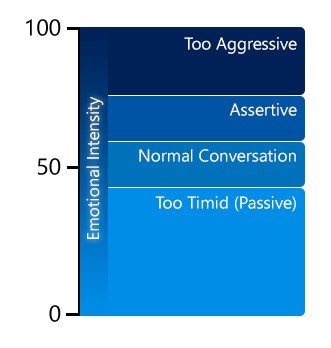What is Assertiveness Skills Training?
Assertiveness training is designed to show you how to develop both aspects of assertiveness:
- Emotional assertiveness. Develop more self-confidence.
- Assertive communication style. Presenting yourself well.
Of the two elements, the most fundamental is the emotional aspect, because if you increase your self-confidence, that will automatically improve your communication style.
So, we teach you two ways to improve self-confidence:
- Eliminate bad mental habits that cause you to feel weaker.
- Replace them with good mental habits that will cause you to feel stronger.
People judge your levels of assertiveness based upon three characteristics: your words, voice tones, and body language.
If you use assertive words, assertive voice tones, and assertive body language, then you will be perceived as assertive, irrespective of how you feel inside.
So we will show you how to perfect your performance so you look and sound exactly right.
Contact Us Today
If you want to know more about this course, or any other Management Training Courses, or their suitability for you or a colleague, call us on 020 3856 3037 or make an enquiry online.
Customer Reviews
L&L Products Europe SAS
BUPA
Assertiveness Skills Training Availability, Pricing and Course Dates
If you have any questions, please phone us (020 3856 3037) or send us a message.
Bespoke Training (In-House or Live Online)
(International Price Varies)
In-House training has been designed to provide a similar experience to our open courses, however we can tailor the content to fit your specific needs.
Plus, travel and hotel accommodation for trainer if needed (Premier Inn type: not the Hilton!)
We are able to train in your timezone.
All our training includes:
- A full day of quality training, delivered by an experienced trainer
- Total of 6 CPD training hours (9am - 4.30pm), plus an additional 2-3 via post-course online independent learning.
- Full digital interactive course notes
- Training certificate
- Access to additional free training material after the course via our post-course portal
- 3 months free telephone coaching: Whilst you are implementing what you have learned, if you need to, you can contact us for support and guidance
Assertiveness Skills Training Course Overview
This Assertiveness Training course covers the following:
Emotional Assertiveness
Assertiveness is an emotion. All emotions are based upon thoughts and beliefs. The most important belief is called, the self-concept which is a person’s belief about who they really are, and how they compare to others.
Non-assertive people have negative beliefs that destroy their emotional strength.
Assertive people have positive beliefs that build their strength.
Over-assertive people have exaggerated beliefs that cause them to be pushy and over-bearing.
We will study how to build the right self-image, which is the basis of spontaneous assertiveness.
Assertive Communication Styles
People judge assertiveness on two things, words and behaviour. Luckily, you can change your words and behaviour and present a performance that corresponds with what others perceive as assertive.
Communication is composed of three elements: words, tone and body language.
- Speech habits. You will learn how to speak assertively.
- Voice tones. You will learn how to sound assertive.
- Body language. You will learn how to look assertive.
Everyone who attends this Assertiveness training course will benefit from knowing how to feel more assertive without appearing aggressive.
Learning Outcomes:
- Feel more assertive in the face of difficult people
- Control the conversation and get the best possible results
- Manage difficult situations better
- Keep control of your emotions
- Use your body language more effectively
- Psych yourself up, not out
- Gain more confidence
Assertiveness Skills Training Course Details
Morning Session
Introduction to assertiveness training
Beliefs > feelings, (emotions) > actions > results
Self-image psychology
Self-talk
Negative habit patterns
Positive habit patterns and self-talk
Stimulus (decision) response
Afternoon Session
Components of communication
Non-assertive speech patterns
Assertive speech habits
Correct and incorrect voice tones
Body language
Preparation is power
Summary and action plan
Assertiveness Skills Training FAQs
How do I join a Corporate Coach Group course?
Is this course offered in-house?
How can I improve my assertiveness?
What are the four steps to being assertive?
What is the course training method? Is it interactive?
Why is it hard for me to be assertive?
What kinds of people attend this Assertiveness Skills course?
Companies We've Trained
Related Articles from our Assertiveness Blog
How to be a Better Negotiator
26 November 2024Boost your negotiation skills with clear steps on BATNA, price moves and value gains. Learn to reach win-win agreements fast and walk away smart when needed.
Continue Reading >How Assertive are You?
9 June 2015Use assertiveness, not aggression. Get clear tips on tone, stance and words to speak up in meetings, deter bullies, handle praise and feedback, and earn respect
Continue Reading >How to Develop your Personality
31 December 2013Learn how to develop an attractive personality by building vitality, compassion, productivity, honesty and humour. Follow steps to make people like, trust you.
Continue Reading >Five Principles of Confident Communication
18 April 2013Discover five proven principles for confident communication. Get clear language, body and voice tips, plus a plan that boosts leadership and manager confidence.
Continue Reading >










